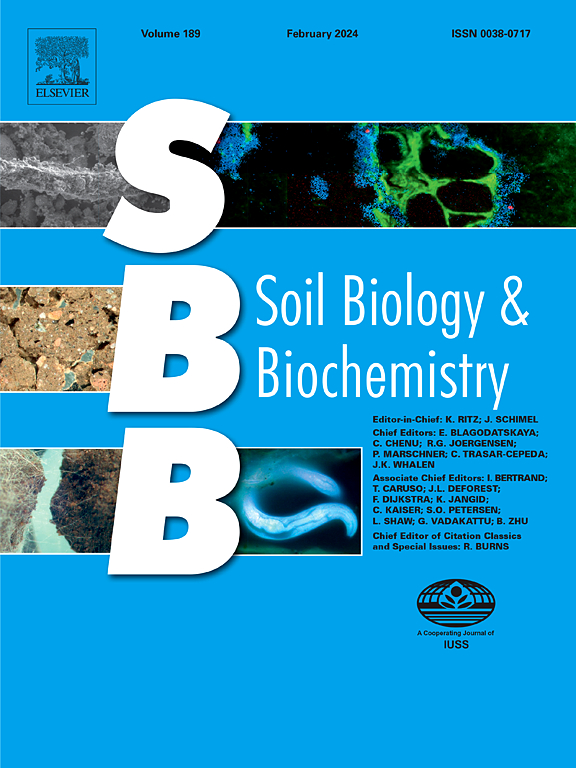升高的温度促进水稻土中依赖甲烷的砷酸盐的减少
IF 9.8
1区 农林科学
Q1 SOIL SCIENCE
引用次数: 0
摘要
温度升高对土壤中砷的生物有效性和物种形成有显著影响。甲烷(CH4)依赖性砷酸盐还原(M-AsR)是砷(V)还原与好氧或厌氧甲烷氧化相结合的过程,已在水稻土中得到广泛证实。然而,在未来全球变暖的情景下,M-AsR的复杂性仍不清楚。在本研究中,我们旨在通过土壤接种和微生物培养来研究温度升高对M-AsR的影响。我们的研究结果表明,M-AsR对温度升高高度敏感。其中,当温度从28℃(稻区白天平均温度)上升到33℃(未来温度条件)时,13CO2和As(III)的生成率分别增加了72.6%和36.1%。定量聚合酶链反应(qPCR)分析显示,温度与arrA基因、pmoA2基因和ANME-mcrA基因的丰度呈正相关。此外,33°C时的微生物群落组成与28°C时明显不同。其特征是II型甲烷营养菌(如Beijerinckiaceae)和厌氧甲烷营养古菌(如Methanosarcinaceae)的相对丰度较高,而I型甲烷营养菌(如Methylomonaceae)的相对丰度较低。总之,我们的研究结果强调了温度在水稻土M-AsR调控中的重要性。升高的温度有可能通过改变功能微生物的丰度和重塑微生物群落来显著增强M-AsR途径。然而,对高温如何促进水稻土M-AsR的机制的详细和全面的了解需要进一步的研究。本文章由计算机程序翻译,如有差异,请以英文原文为准。


Elevated temperature promotes methane-dependent arsenate reduction in paddy soils
Elevated temperature significantly impacts arsenic (As) bioavailability and speciation in soils. Methane (CH4)-dependent arsenate reduction (M-AsR), a process in which As(V) reduction coupled with aerobic or anaerobic methane oxidation, has been extensively demonstrated in paddy soils. However, the intricacies of M-AsR under future global warming scenarios remain unclear. In this study, we aimed to investigate the effect of elevated temperature on M-AsR by conducting incubations with soil inocula and microcosm. Our findings indicated that M-AsR was highly sensitive to elevated temperature. Specifically, the generation rates of 13CO2 and As(III) increased by 72.6 % and 36.1 %, respectively, when the temperature rose from 28 °C (the average daytime temperature in the rice-growing regions) to 33 °C (the future temperature condition). Quantitative polymerase chain reaction (qPCR) analysis revealed a positive correlation between temperature and the abundance of the arrA gene, the pmoA2 gene and the ANME-mcrA gene. Additionally, microbial community composition at 33 °C differed markedly from 28 °C. It was characterized by a greater relative abundance of type II methanotrophs (e.g., Beijerinckiaceae) and anaerobic methanotrophic archaea (e.g., Methanosarcinaceae), and by a decrease in type I methanotrophs (e.g., Methylomonaceae). Overall, our results highlight the importance of temperature in regulating M-AsR in paddy soils. Elevated temperature has the potential to significantly enhance the M-AsR pathway by changing the abundance of functional microorganisms and reshaping the microbial community.
求助全文
通过发布文献求助,成功后即可免费获取论文全文。
去求助
来源期刊

Soil Biology & Biochemistry
农林科学-土壤科学
CiteScore
16.90
自引率
9.30%
发文量
312
审稿时长
49 days
期刊介绍:
Soil Biology & Biochemistry publishes original research articles of international significance focusing on biological processes in soil and their applications to soil and environmental quality. Major topics include the ecology and biochemical processes of soil organisms, their effects on the environment, and interactions with plants. The journal also welcomes state-of-the-art reviews and discussions on contemporary research in soil biology and biochemistry.
 求助内容:
求助内容: 应助结果提醒方式:
应助结果提醒方式:


